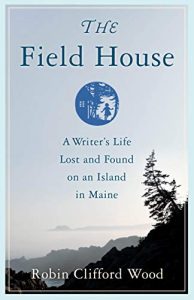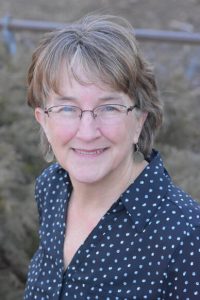Heeding the Call of a Mentor From the Past
 By Robin Clifford Wood
By Robin Clifford Wood
In 2008 when I began working on Rachel Field’s biography, I was 47 years old, just the age Rachel had reached when she died suddenly in 1942. I didn’t recognize the confluence of our ages back then, but now I believe the timing was no coincidence.
Rachel Field was a renowned writer in her day, earning fame as a playwright, poet, and award-winning writer of both novels and children’s books. I didn’t know Rachel’s history in 1993 when I first stepped into her abandoned summer house on Sutton, a tiny, roadless island off the coast of Maine. I only knew she’d been a famous writer who wrote in this very house. I had no idea how she would change my world, no idea I would come to love this stranger, gone decades before I was born.
A year later my husband and I settled in for our first summer stay in Rachel’s house, still furnished with her wicker chairs and porch rockers, her scotty-dog trinkets, and magazines in the attic. Rachel’s spirit danced from the wooden walls, but I was a full-time mother of four small children. My lifetime writing aspirations remained quiet, upstaged by child energy. I’d published a couple of articles, years apart, but motherhood absorbed me heart and soul. I also lacked confidence, sure that my rhyming verse, though entertaining, was juvenile. During our first few summers in “The Field House,” I paid little attention to writing or to Rachel Field but over time began reading her work.
Rachel Field’s writing resonates with me, abounding in the delights of childhood and nature, our tender vulnerabilities, and the stifling power of societal conformity. Plus, her poetry rhymes! That began my growing fascination with Rachel and her work. Information about her was full of gaps, so I set out to find her lost story.
In archive collections all over the country, I read Rachel’s lifetime of letters. She became both sister and mentor. Thanks to Rachel, I got my first glossy magazine publication; enrolled in an MFA program for creative writing, gave talks about her from Maine to Florida.
For months at a time I put the project away. It was too hard, took too long. But life kept throwing it back at me. I was asked to read Rachel’s poetry for a state-wide event, to give a talk, to visit someone’s private Rachel Field collection.
The research dovetailed magically with my life. Just when I needed to research Rachel’s Hollywood years, my daughter’s softball team invited parents to join their spring training in California. Two of my other children were attending Yale when I learned about extensive Rachel Field records in Yale’s archives. Another important cache of letters was at Vassar, my mother’s alma mater, so Mom spent a day with me in Vassar’s archives. Motherhood, family, and writing came together.
In the summer of 2013, I found myself with a couple of weeks free before a road trip to New Orleans. My youngest daughter had just transferred to Tulane University. I pulled out my Rachel notes and stumbled upon a name that struck a chord: Lyle Saxon. In a 1928 journal, on the shelves of the Field House, I’d found handwritten entries by Rachel’s mother: “Rachel and Lyle all devotion.” “She has an almost maternal care of him.” It sounded like a love interest, but the man she married was named Arthur. I had never resolved that mystery, nor the source of intense heartache emanating from Rachel’s later poems. Could Lyle Saxon be the mysterious Lyle?
I was soon in touch with Saxon’s biographer. In a torrent of excitement, she described 30 letters from Rachel to Lyle, pulsing with passion and beauty. Finally I asked, “Where are these letters?”
“They’re in the archives at Tulane University,” she said. I was dumbstruck. Life, fate, Rachel’s spirit – something was inexorably drawing me forward.
I got through the last roadblock to finishing Rachel’s story after losing my mother in 2014. She took her last breath on March 15th, the Ides of March, a fittingly portentous date for a death that realigned my universe. I put away Rachel’s story and spent a year on a memoir about Mom, daughters, and the tangle of legal, ethical, and emotional complexities surrounding the end of life.
With that project complete, I listlessly reopened my Rachel Field notes, turning to the final California years, the part I hadn’t been able to get through. That’s when I saw Rachel’s date of death – March 15, 1942, The Ides of March. My heart raced.
Perhaps, I thought, I hadn’t been able to finish Rachel’s life because I couldn’t bear to write her death. But if I could write Mom’s death, I could write Rachel’s. I got back to work.
Despite marrying at age forty, Rachel hoped desperately for a child, to no avail. Finally, she adopted a baby girl, and her longing for motherhood was answered. It was a short-lived bliss. Rachel died when her daughter was only two, the age of my youngest when we took residence in her home.
Rachel died at 47. I was 47 when I finally heeded the call to revive her lost story. Was I carrying out her unfinished desires, fulfilling part of her stolen destiny? In a strange way, my life and Rachel’s have completed each other. I brought children to the Field House; Rachel brought me writing success. Rachel offered me her bright spirit, her work ethic, and her model of equanimity. She inspired me to strive for more. I devoted years to bringing her light back to the world. Rachel, the dear friend I would never meet, gave me the gifts of her story, her guidance, and her open heart. I hope, somehow, that my gifts to her have been delivered.
—
 ROBIN CLIFFORD WOOD has a BA from Yale University, an MA in English from the University of Rochester, and an MFA in creative writing from the Stonecoast program at the University of Southern Maine. During twenty-five years as a full-time mom, she published local human-interest features in New Hampshire, New York, and Massachusetts and spent seven years as a regular columnist, first in Massachusetts, then for Maine’s Bangor Daily News. She began teaching college writing in 2015.
ROBIN CLIFFORD WOOD has a BA from Yale University, an MA in English from the University of Rochester, and an MFA in creative writing from the Stonecoast program at the University of Southern Maine. During twenty-five years as a full-time mom, she published local human-interest features in New Hampshire, New York, and Massachusetts and spent seven years as a regular columnist, first in Massachusetts, then for Maine’s Bangor Daily News. She began teaching college writing in 2015.
Her articles have appeared in Port City Life magazine, Bangor Metro, and Solstice literary magazine, which published her powerful essay “How Do You Help Your Parents Die?” in its spring 2019 issue. Her award-winning poetry received national recognition from the 2020 Writer’s Digest Competition. Wood lives in central Maine with her husband and dogs. The Field House is her first book. For more information, please visit www.robincliffordwood.com.
THE FIELD HOUSE
Born of illustrious New England stock, Rachel Field was a National Book Award–winning novelist, a Newbery Medal–winning children’s writer, a poet, playwright, and rising Hollywood success in the early twentieth century. Her light was abruptly extinguished at the age of forty-seven, when she died at the pinnacle of her personal happiness and professional acclaim.
Fifty years later, Robin Clifford Wood stepped onto the sagging floorboards of Rachel’s long-neglected home on the rugged shores of an island in Maine and began dredging up Rachel’s history. She was determined to answer the questions that filled the house’s every crevice: Who was this vibrant, talented artist whose very name entrances those who still remember her work? Why is that work—so richly remunerated and widely celebrated in her lifetime—so largely forgotten today? The journey into Rachel’s world took Wood further than she ever dreamed possible, unveiling a life fraught with challenge, and buried by tragedy, and yet incandescent with joy.
The Field House is a book about beauty—beauty in Maine island landscapes, in friendship, love, and heartbreak; beauty hidden beneath a woman’s woefully unbeautiful exterior; beauty in a rare, delightful spirit that still whispers from the past. Just listen.
BUY HERE
Category: On Writing

























